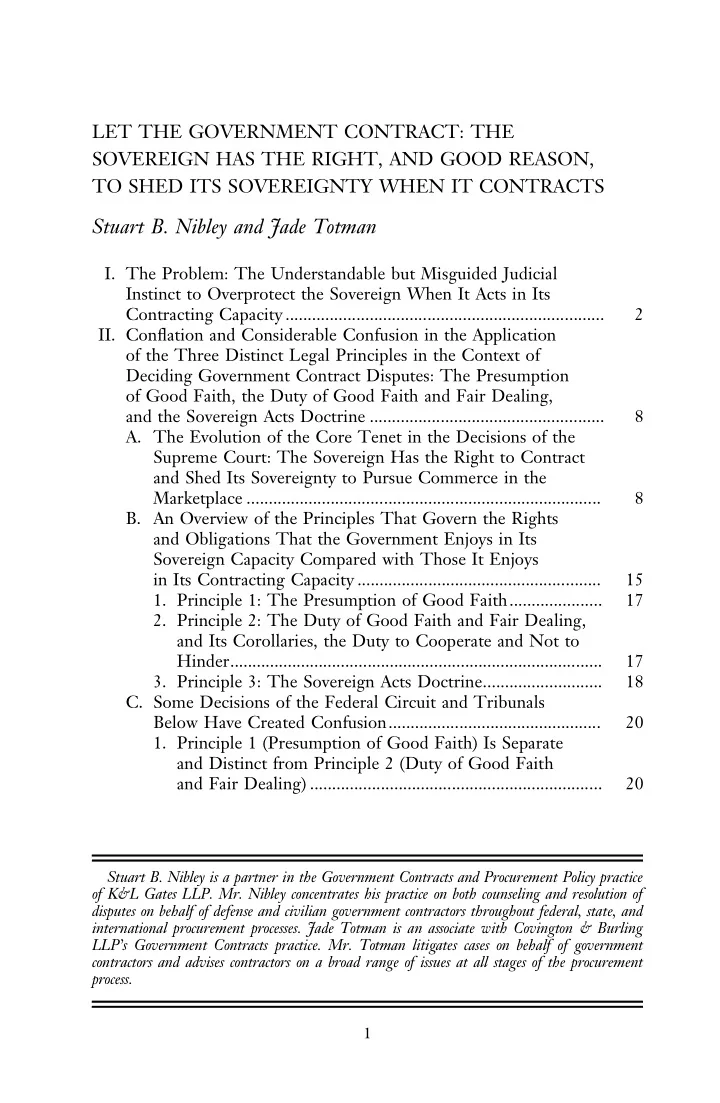

LET THE GOVERNMENT CONTRACT: THE SOVEREIGN HAS THE RIGHT, AND GOOD REASON, TO SHED ITS SOVEREIGNTY WHEN IT CONTRACTS Stuart B. Nibley and Jade Totman I. The Problem: The Understandable but Misguided Judicial Instinct to Overprotect the Sovereign When It Acts in Its Contracting Capacity ........................................................................ 2 II. Conflation and Considerable Confusion in the Application of the Three Distinct Legal Principles in the Context of Deciding Government Contract Disputes: The Presumption of Good Faith, the Duty of Good Faith and Fair Dealing, and the Sovereign Acts Doctrine ..................................................... 8 A. The Evolution of the Core Tenet in the Decisions of the Supreme Court: The Sovereign Has the Right to Contract and Shed Its Sovereignty to Pursue Commerce in the Marketplace ................................................................................ 8 B. An Overview of the Principles That Govern the Rights and Obligations That the Government Enjoys in Its Sovereign Capacity Compared with Those It Enjoys in Its Contracting Capacity ....................................................... 15 1. Principle 1: The Presumption of Good Faith..................... 17 2. Principle 2: The Duty of Good Faith and Fair Dealing, and Its Corollaries, the Duty to Cooperate and Not to Hinder.................................................................................... 17 3. Principle 3: The Sovereign Acts Doctrine........................... 18 C. Some Decisions of the Federal Circuit and Tribunals Below Have Created Confusion................................................ 20 1. Principle 1 (Presumption of Good Faith) Is Separate and Distinct from Principle 2 (Duty of Good Faith and Fair Dealing) .................................................................. 20 Stuart B. Nibley is a partner in the Government Contracts and Procurement Policy practice of K&L Gates LLP. Mr. Nibley concentrates his practice on both counseling and resolution of disputes on behalf of defense and civilian government contractors throughout federal, state, and international procurement processes. Jade Totman is an associate with Covington & Burling LLP’s Government Contracts practice. Mr. Totman litigates cases on behalf of government contractors and advises contractors on a broad range of issues at all stages of the procurement process. 1
2 Public Contract Law Journal • Vol. 42, No. 1 • Fall 2012 2. Recent Federal Circuit Decisions in This Area of the Law Have Been Inconsistent and Confusing, Effectively Importing the Concept of Subjective Bad Faith from Principle 1 (Presumption of Good Faith) into Application of Principles 2 (Duty of Good Faith and Fair Dealing) and 3 (Sovereign Acts Doctrine) .......................................... 23 a. Am-Pro Protective Agency, Inc. v. United States ................ 23 b. Centex Corp. v. United States ............................................ 25 c. Precision Pine & Timber Co. v. United States .................... 26 III. The Ill Effects of Overprotecting the Government and Conflating the Three Principles....................................................... 32 A. Some Decisions Issued After the Federal Circuit’s Decision in Precision Pine Have Conflated and Confused the Three Principles, Applying Precision Pine ’s Legal Analysis to Situations Where Only Government Contractual Acts, Not Sovereign Acts, Were Involved ......................................... 32 B. Other Decisions Have Employed a More Careful Analysis in an Attempt to Partially Undo Some of the Melding of the Three Principles That Has Followed the Federal Circuit’s Decisions in Am-Pro Protective Agency, Inc . and Precision Pine ........................................................................ 36 IV. Conclusion: The Practical Effects of Conflating the Three Principles ........................................................................................... 39 I. THE PROBLEM: THE UNDERSTANDABLE BUT MISGUIDED JUDICIAL INSTINCT TO OVERPROTECT THE SOVEREIGN WHEN IT ACTS IN ITS CONTRACTING CAPACITY Originally, this Article intended to cover a number of topics and deci- sional patterns in which some decisions issued by the U.S. Court of Appeals for the Federal Circuit (Federal Circuit) have had the effect of overprotect- ing the Federal Government in its contractual relationships, to the detriment of all constituents to the procurement process. Thus, decisions that this Ar- ticle might have discussed include those concerning the application of mu- tual obligations to file claims under the Contract Disputes Act; 1 the dispro- portionate application of massive forfeitures and penalties to contractors in situations in which they, like the Government, were victims; 2 and a series 1. Contract Disputes Act of 1978, Pub. L. No. 95-563, 92 Stat. 2383 (codified as amended at 41 U.S.C. §§ 7101–7109 (Supp. IV 2010)); see, e.g ., M. Maropakis Carpentry, Inc. v. United States, 609 F.3d 1323, 1328–29 (Fed. Cir. 2010) (finding that the court lacked jurisdiction over the contractor’s defense that the Government caused delays because the contractor failed to submit a valid claim); Parsons Global Servs., Inc. v. McHugh, 677 F.3d 1166, 1170–72 (Fed. Cir. 2012) (finding that the court lacked jurisdiction over the contractor’s claim because its request was not nonroutine). 2. See, e.g ., Long Island Sav. Bank, FSB v. United States, 503 F.3d 1234 (Fed. Cir. 2007). The chairman and chief executive officer of Long Island Savings Bank (LISB), James J. Conway Jr.,
Recommend
More recommend